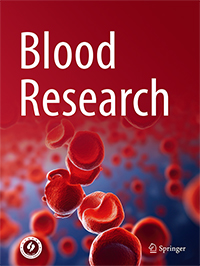Korean J Hematol 1999; 34(1):
Published online March 31, 1999
© The Korean Society of Hematology
급성 전골수성백혈병에서 All-trans-retinoic Acid(ATRA) 관해유도 후 복합항암화학요법의 효과
정주영, 김학균, 방수미, 유영진, 이문희, 안진석, 이종태, 임석아, 박선양, 김병국, 김노경
서울대학교 의과대학 내과학교실 및 암연구센터
The Long-term Effect of Induction Chemotherapy With All-trans-retinoic Acid(ATRA) Followed by Consolidation Chemotherapy for Newly Diagnosed Acute Promyelocytic Leukemia
Background: Acuts promyelocytic leukemia(APL, AML M3 in FAB classification) that represents 5% to 15% of cases of acute myeloid leukemia(AML), is a distinct subtype of
acute mysloid leukemia in morphologic feature, genetic rearrangement like t(15;17), PML-RARα, associated coagulopathy and good response to induction therapy by
all-fans-retinoic acid(ATRA). The longterm outcome of APL treatment using ATRA as remission induction followed by consolidation chemotherapy has been reported extremely
rarely in Korea.
Methods: Patisnts diagnosed as APL from March 1993 to October 1996 were assigned to receivs induction thsrapy wlth ATRA and consolidation chemotherapy with combination chemotherapy(scheduled as Ara-C+DNR, Mit+Ara-C, Ida+Ara-C), followed up till July 1997(median F/U duration : 25.7 months) to yield complete remission rate, disease-free survival, overall survival and side effects.
Results: The 21 patients, who has not been previously treated, were with median age of 45 years(range 17 to 63 years), and with sex ratio of 1.1:1. After induction by
ATRA, CR was obtained in 16(CR rats:88.9%) out of 18 evaluable cases. CR was maintained in 9 cases, whereas 2 cases were dead during consolidation therapy, and relapse were found in 5 cases after consolidation chemotherapy among 16 cases who gained remission. Disease-free survival was 33.9 months(3.9∼48.8), the estimated disease-free survival at 1, 2, 3 years were 73.8, 48.9, 46.9 percent respectively. The estimated overall survival rate at 1, 2, 3 ysars were 66.3, 64.2, 64.2 percent respectively.
The side effects associated with ATRA treatment were obsevsd in 12 cases(ATRA syndrome were 2 cases), and severe coagulopathy(intracranial hemorrhage) was in 1 case who was dead on day 5.
Conclusion: In conclusion, the remission induction therapy with ATRA followed by consolidation chemotherapy resultsd in less severs complication, lower relapse rate, prolonged dissase-free survival and overall survival than the conventional chemotherapy in acuts promyelocytic leukemia.
Keywords Acute promyelocytic leukemia, All-trans-retinoic acid(ATRA)
Article
Korean J Hematol 1999; 34(1): 80-89
Published online March 31, 1999
Copyright © The Korean Society of Hematology.
급성 전골수성백혈병에서 All-trans-retinoic Acid(ATRA) 관해유도 후 복합항암화학요법의 효과
정주영, 김학균, 방수미, 유영진, 이문희, 안진석, 이종태, 임석아, 박선양, 김병국, 김노경
서울대학교 의과대학 내과학교실 및 암연구센터
The Long-term Effect of Induction Chemotherapy With All-trans-retinoic Acid(ATRA) Followed by Consolidation Chemotherapy for Newly Diagnosed Acute Promyelocytic Leukemia
Joo Young Jeong, Hak Kyun Kim, Soo Mi Bang, Young Jin Yoo, Muhn Hee Lee, Jin Seok Ahn, Jong Tae Lee, Seok Ah Lim, Seon, yang Park, Byoung Kook Kim, Noe Kyeong Kim
Department of Internal Medicine and Cancer Research Center, Seoul National University College of Medicine, Seoul, Korea
Abstract
Background: Acuts promyelocytic leukemia(APL, AML M3 in FAB classification) that represents 5% to 15% of cases of acute myeloid leukemia(AML), is a distinct subtype of
acute mysloid leukemia in morphologic feature, genetic rearrangement like t(15;17), PML-RARα, associated coagulopathy and good response to induction therapy by
all-fans-retinoic acid(ATRA). The longterm outcome of APL treatment using ATRA as remission induction followed by consolidation chemotherapy has been reported extremely
rarely in Korea.
Methods: Patisnts diagnosed as APL from March 1993 to October 1996 were assigned to receivs induction thsrapy wlth ATRA and consolidation chemotherapy with combination chemotherapy(scheduled as Ara-C+DNR, Mit+Ara-C, Ida+Ara-C), followed up till July 1997(median F/U duration : 25.7 months) to yield complete remission rate, disease-free survival, overall survival and side effects.
Results: The 21 patients, who has not been previously treated, were with median age of 45 years(range 17 to 63 years), and with sex ratio of 1.1:1. After induction by
ATRA, CR was obtained in 16(CR rats:88.9%) out of 18 evaluable cases. CR was maintained in 9 cases, whereas 2 cases were dead during consolidation therapy, and relapse were found in 5 cases after consolidation chemotherapy among 16 cases who gained remission. Disease-free survival was 33.9 months(3.9∼48.8), the estimated disease-free survival at 1, 2, 3 years were 73.8, 48.9, 46.9 percent respectively. The estimated overall survival rate at 1, 2, 3 ysars were 66.3, 64.2, 64.2 percent respectively.
The side effects associated with ATRA treatment were obsevsd in 12 cases(ATRA syndrome were 2 cases), and severe coagulopathy(intracranial hemorrhage) was in 1 case who was dead on day 5.
Conclusion: In conclusion, the remission induction therapy with ATRA followed by consolidation chemotherapy resultsd in less severs complication, lower relapse rate, prolonged dissase-free survival and overall survival than the conventional chemotherapy in acuts promyelocytic leukemia.
Keywords: Acute promyelocytic leukemia, All-trans-retinoic acid(ATRA)

Article Tools
Stats or Metrics
Related articles in BR
-
Treatment for relapsed acute promyelocytic leukemia: what is the best post-remission treatment?
Gi-June Min, Byung-Sik Cho, Sung-Soo Park, Silvia Park, Young-Woo Jeon, Seung-Ah Yahng, Seung-Hawn Shin, Jae-Ho Yoon, Sung-Eun Lee, Ki-Seong Eom, Yoo-Jin Kim, Seok Lee, Chang-Ki Min, Seok-Goo Cho, Jong Wook Lee, Hee-Je Kim
Blood Res 2022; 57(3): 197-206 -
Outcome of childhood acute promyelocytic leukemia treated using a modified AIDA protocol
Myoung-Hyun Kim, Cheol-Soon Choi, Jae Wook Lee, Pil-Sang Jang, Nak-Gyun Chung, Bin Cho, Dae-Chul Jeong, and Hack-Ki Kim
Korean J Hematol 2010; 45(4): 236-241 -
Current routine practice and clinico-pathological characteristics associated with acute promyelocytic leukemia in Korea
Sunhyun Ahn, Joon Seong Park, Seong Hyun Jeong, Hyun Woo Lee, Jun Eun Park, Mi Hyang Kim, Yang Soo Kim, Ho Sup Lee, Tae Sung Park, Eunkyoung You, Insoo Rheem, Joowon Park, JI Young Huh, Myung Seo Kang, and Sung Ran Cho
Blood Res 2013; 48(1): 31-34




 PDF
PDF Standard view
Standard view Export citation
Export citation Share
Share  Previous Article
Previous Article



